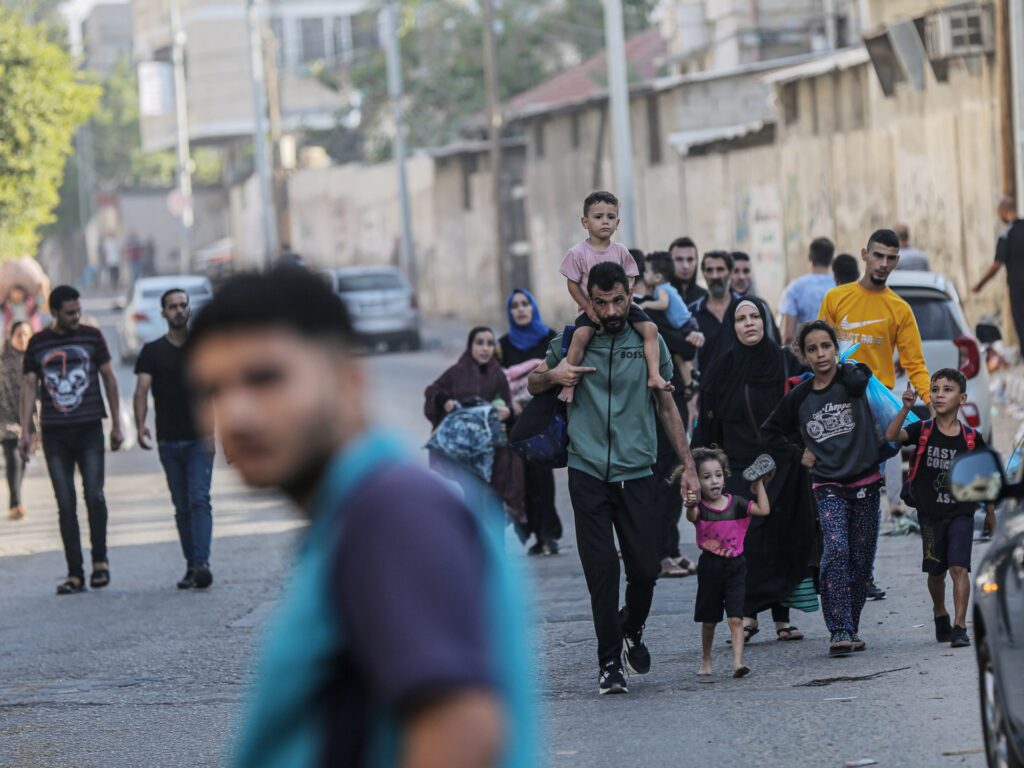Thousands of people have moved to southern Gaza following the order, but no place is safe from Israeli bombing, and some say they would rather die in their homes.
Gaza City, Gaza – Ahmed al-Saadi and his family have so far escaped an Israeli bombing campaign that has devastated the entire Gaza Strip since last Saturday, killing more than 1,900 people.
But after they took shelter at the United Nations School, Al-Saadi said it too came under repeated air attacks.
“Some people were killed. If schools are not safe, where can we go? Where can the entire population seek safety?” he asked.
Mr al-Saadi’s questions are at the heart of a growing mix of despair and defiance in the blockaded coastal enclave as Israel prepares for a ground offensive on Gaza.
Israel has issued military orders for residents of the northern and central Gaza Strip to evacuate their homes, which are currently classified by Israel as a “combat zone.” On Thursday night, the order gave the people of Gaza and even UN personnel stationed there just 24 hours to leave.
Israeli forces distributed pamphlets from the air and made prerecorded phone calls informing residents of their intention to target “terrorist sites” linked to Hamas and other militant groups.
“They can only return to Gaza City if another announcement is made allowing them to return,” the military said. “Stay out of the fenced area with the State of Israel.”
The United Nations has called the move “impossible” and warned of “catastrophic consequences,” but Gaza’s government media office says the Israeli decision reveals Israel’s true “criminal face.” He commented that he was doing it.
The order prompted thousands of people in the Gaza Strip to move towards the south of the strip on Friday.
However, Israeli warplanes targeted two trucks and a car at three different locations on Salah al-Din and Al Rashid streets. The vehicle was carrying a family heading to the southern Gaza Strip.
The attack killed at least 70 Palestinians, most of them women and children, and injured more than 200, according to the Gaza government media office.
For many Palestinians, this moment reflects the experience of their ancestors in 1948, when militias and then the newly established Israeli army destroyed more than 500 Palestinian villages and towns. Thousands of people have been killed and more than 750,000 Palestinians have been forced to flee their lands. Palestinians refer to that era as the Nakba, or catastrophe.
At that time, no women or children were saved. Not the elderly or people fleeing Israeli attacks. Those who were evacuated in 1948 have still not been able to return home. For those who have fled on Israeli orders, the possibility of recurrence appears real if there are any left to return in the first place.
A member of the Gulbawi family told a news conference that he was traveling south with more than 20 relatives and members of the Abu Ali family.
“Most were women and children,” he says. “After the first Israeli attack targeted us, I lost consciousness. When I woke up and looked around, I saw my own family members being killed and injured. The brain was falling out of her head.”
When the ambulance arrived on the scene, there was another Israeli air attack.
“I hid behind the wall,” the man said. “I swear to you, there’s been a third airstrike. It looks like they want to kill all the women and children.”
But while thousands of people have been evacuated, many others are refusing to do so, and overall support for armed resistance to the Israeli attack appears to be intact. On Friday, crowds gathered on the streets in different parts of the Gaza Strip, chanting slogans and urging people not to leave their homes.
Bombings of convoys of people leaving for the south further reinforced these feelings.
“If they are bombing us everywhere anyway, why should we leave? We want to stay at home and die at home,” said a Gaza City resident who refused to evacuate. Karam Abu Kuta told Al Jazeera.
Fifteen minutes earlier, a minibus carrying a family and their belongings traveling south from Gaza on the Salah al-Din road was blown up. All were killed on the spot. https://t.co/M2996cEAgj
— Yunis Tirawi | Ytirawi (@ytirawi) October 13, 2023
Israel continues its total blockade of the Gaza Strip into its seventh day, further underdevelopment of the humanitarian landscape and blocking the entry of emergency medical equipment and everyday supplies into the enclave.
“They have cut us off from water, food and electricity, and now they are forcing us to leave our homes. Why are they doing this to us? Is it because we live in Gaza? Is it just because we are Palestinians?” Residents of Gaza City told Al Jazeera they expressed feelings of frustration and a sense of injustice among the people.
“This is a second Nakba. However, the occupying forces must understand that we will continue to put down roots in our land and defend our legitimate rights to freedom, peace and security. ”

